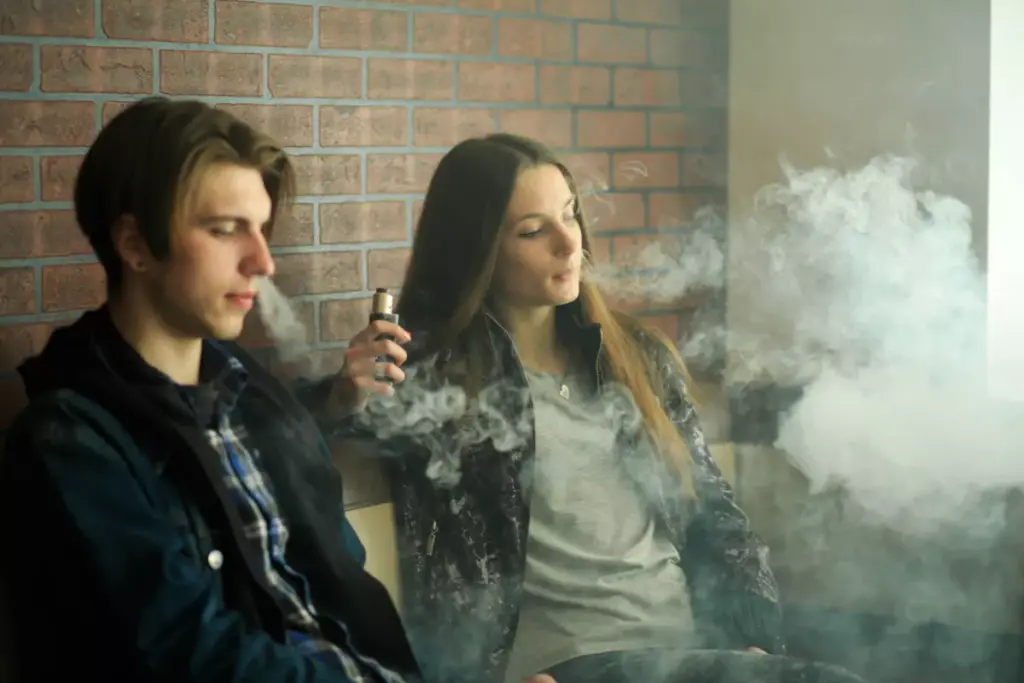In just the past few months, vaping has evolved from an issue of concern into a national health crisis with the recent outbreak of serious lung injuries from the use of e-cigarette and other vaping products. As of mid-November 2019, every state but Alaska has collectively reported 2,172 cases to the Center for Disease Control (CDC) of EVALI, the now official designation for “e-cigarette or vaping product use-associated lung injury.” Of those, 42 people have died.
As of late October 2019, 200 possible cases of EVALI were reported to the Massachusetts Department of Public Health (61 of those cases have been reported to the CDC). By early November, three people in the state had died from a vaping-related illness.
Over the past few years, vaping products have come under scrutiny across the country. Until the outbreak of EVALI cases, concern focused on the issue that flavored vaping products ran counter to industry claims portraying vaping as a safe alternative to smoking tobacco. Instead of weaning people off of cigarettes, it attracted more people, especially people under 30, into consuming tobacco.
And now people are becoming sick and even dying from vaping. Unsurprisingly, the alarm has led to swift — and often controversial — reaction from state and federal regulatory agencies, advocacy groups, and government leaders.
Massachusetts is no exception. In fact, the state is leading the charge. Given the quickly unfolding situation, it’s important to understand who regulates vaping in Massachusetts.
Vaping in Massachusetts
Vaping has been problematic for health professionals and regulators since at least 2008 when the FDA first attempted to regulate vaping nationally. In 2010, the U.S. Court of Appeals for the D.C. Circuit ruled in Sottera, Inc. v. Food & Drug Administration that e-cigarettes could be regulated as tobacco products under the Tobacco Control Act of 2009.
Local communities within Massachusetts soon followed the FDA’s lead. In 2011, Boston passed regulations defining vaping as tobacco products. Other communities quickly joined with Boston, enacting similar regulations, including banning the use of vape products in the workplace and restricting their sale to adults only.
State and local laws have evolved over the past few years in Massachusetts, but the foundation of those laws centers on defining vaping as a tobacco-related activity and subject to regulations set forth for tobacco products. This description of tobacco products is reflected in Massachusetts general state law Chapter 270 Section 6, which states, in part:
Tobacco product means a product containing, made or derived from tobacco or nicotine that is intended for human consumption, whether smoked, chewed, absorbed, dissolved, inhaled, snorted, sniffed or ingested by any other means including…electronic cigarettes, electronic cigars, electronic pipes, electronic nicotine delivery systems or any other similar products that rely on vaporization or aerosolization, [and including] any component, part or accessory.
Massachusetts Vaping Ban
In September, Republican Governor Charlie Baker issued an executive order declaring a public emergency and placing a four-month ban on the sale of all vaping products. Thus far it is the toughest crackdown on vaping of any state in the nation and seeks to include medical marijuana as well as tobacco vape products.
Governor Baker’s ban was immediately challenged by a lawsuit brought by the Vapor Technology Association, an industry trade group, saying the order would “contravene the public interest.” Participants in the lawsuit characterize Governor Baker’s ban as a “death sentence” for their business.
In late October, Suffolk County Superior Court Judge Douglas Wilkins ruled that the ban could remain in place but as it stood would require revisions due to its “overreach.”
Since then, the Massachusetts Supreme Court upheld the lower court’s ruling that Governor Baker’s ban was flawed while allowing it to remain in place.
The ban was lifted for medical marijuana users. Upon exempting the vape ban for medicinal cannabis, however, the Massachusetts Cannabis Control Commission stepped in by quarantining all “marijuana products and devices that rely on vaporization or aerosolization, including, but not limited to, vape pens, vape cartridges, aerosol products, and inhalers.” Thus, medical marijuana users are restricted to using vaporizers only to heat ground marijuana flower.
In the meantime, the Massachusetts House of Representatives has passed a ban on all flavored tobacco products, including menthol cigarettes, and placed a 75 percent excise tax on all nicotine vaping products.
To be sure, as illnesses and fatalities mount, the issue of vaping in Massachusetts and regulations around the sale and use of vaping products remains a moving target even as researchers seek to definitively isolate the source of vaping related illness.
Professionals in the healthcare industry who are interested in making a difference in this and other healthcare challenges can learn more about becoming a leader through the Master of Healthcare Administration program at Boston College, Woods College of Advancing Studies.
